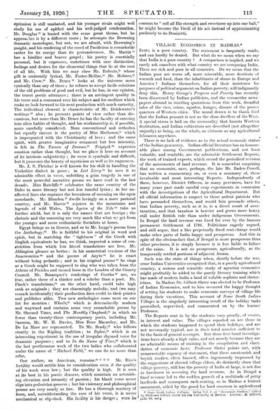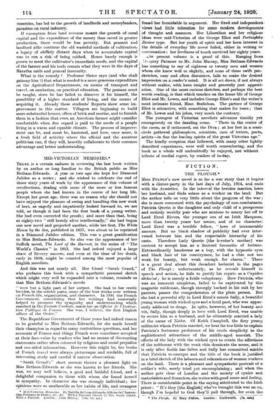VILLAGE ECONOMICS IN MADRAS.• INDIA is a poor country. The
statement is frequently made, and can hardly be denied. But what do we mean when we say that India is a poor country ? A comparison is implied, and we rarely ask ourselves with what country we are comparing India. There are rich and poor in all countries. Do we mean that the Indian poor are worse off, more miserable, more destitute of warmth and food, than the inhabitants of slums in Europe and America ? Indians themselves, for all their insistence for purposes of political argument on Indian poverty, will indignantly deny this. Henry George's Progress and Poverty has recently been discovered by Indian publicists, and the vernacular news- papers abound in startling quotations from this work, dreadful tales of the vice, crime, squalor, hunger, disease of the poorer quarters of Western cities. The moral drawn is to thank God that the Indian peasant is not as the slum-dwellers of the West. A special stress is laid on the immorality that haunts Western destitution, and Indian cultivators are described (not altogether unjustly) as being, on the whole, as virtuous as any agricultural labourers anywhere. •
There is no lack of evidence as to the actual economic status of the Indian peasantry. Indian official literature has an honour- able place among Government publications, and not least valuable, and readable, are the admirable Settlement Reports, the work of trained experts, which record the periodical revision of the assessments of land revenue. It is somewhat surprising that no economist, save, perhaps, the late Mr. Baden-Powell, has written a commentary on, or even a summary of, these invaluable and most interesting Reports. Independently of these, however, District Officers, in many provinces, have for many years past made careful crop experiments in connexion with the investigations of the Agricultural Department. But all official information is suspect to those ardent patriots who have persuaded themselves, and would fain persuade others, that Indian poverty, such as it is, is a direct result of over- taxation, and that taxation is heavier and grows more heavy still under British rule than under indigenous Governments. In Bengal the land revenue was fixed for ever by the famous permanent Settlement of 1791. Politicians eagerly argued, and still argue, that a like perpetually fixed rent-charge would make other parts of India happy and prosperous. And this in spite of the obvious fact that, if Bengal is more prosperous than other provinces, it is simply because it is less liable to failure of the rains.. It is not so prosperous, agriculturally, as the temporarily settled portions of adjacent Assam.
Such was the state of things when, shortly before the war, some Indian Universities recognized that, in a purely agricultural country, a serious and scientific study of agrarian economics might profitably be added to the purely literary training which has made of modern India a land of voluble sophists and rhetor- icians. In Madras Dr. Gilbert Slater was elected to be Professor of Indian Economics, and to him occurred the happy thought of setting his students to make economic surveys of village life during their vacations. This account of Some South Indian Villages is the singularly interesting result of the holiday tasks prescribed, supervised, and commented on by the learned Professor.
The Reports sent in by the students vary greatly, of course, in interest and value. The villages reported on aro those in which the students happened to spend their holidays, and are not necessarily typical, nor is their total number sufficient to be the basis of general averages. But these first-hand investiga- tions have already a high value, and not merely because they are an admirable means of training in the compilation and eluci- dation of economic facts. Professor Slater points out, with unanswerable cogency of statement, that these amateurish and boyish studies, often biassed, often ingenuously impressed by the suggestions of shrewd village elders, do distinctly show that village poverty, still less the poverty of India at large, is not due to harshness in assessing the land revenue. As in Bengal a fixed revenue led to the sudden growth of a multitude of petty landlords and consequent rack-renting, so in Madras a lenient assessment, aided by the greed for land common in agricultural • Some South Indian Villages. Being Vol. I. of " Economic Studies;' edltel by Professor Biltert Slater for the University of Madras. London : fi Milford, fits. ed. net.1 ebturtries, has led to the growth of landlords and moneylenders, parasites on rural :industry.
If exemption from land revenue meant-the` growth of rural capital and the expenditure of the money thus saved in greater production, there would be less poverty. But peasant and landlord alike continue the old wasteful methods of cultivation, a legacy of alrefidy distant days when to accumulate capital was to run a risk of • being robbed. Hence barely enough is grown to meet the cultivator's immediate needs, and the capital' of the farmer and bis tools remain what they were in the days of Maratha raids and general insecurity.
What is the remedy ? Professor Slater says (and who shall gainsay him"?) that what is needed is a more generous expenditure on the Agricultural Departments; on means of transport and travel, on sanitation, on practical education. The peasant must be taught, since he has failed to discover it for himself, the possibility of a higher standard of living, and the means of acquiring it. Already these students' Reports show some im- provement in this matter. Villagers are beginning to build more substantial houses, often of brick and mortar, and to furnish them in a fashion that even an American farmer- might' consider comfortable when due regard is paid to the-needs of a people living in a warm and equable climate. The process of improve- ment can be, and must be, hastened, and here, once more, is
• fresh field of activity where the official and the amateur politician can, if they will, heartily collaborate to their common advantage and better understanding.



































 Previous page
Previous page